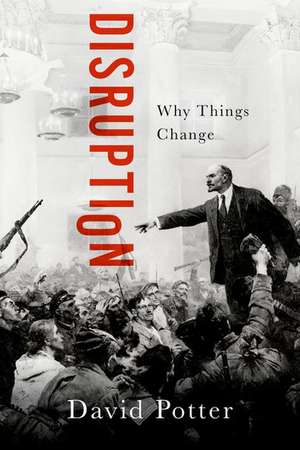Disruption: Why Things Change
Autor David Potteren Limba Engleză Paperback – 29 aug 2024
| Toate formatele și edițiile | Preț | Express |
|---|---|---|
| Paperback (1) | 90.34 lei 11-16 zile | +26.48 lei 7-13 zile |
| Oxford University Press – 29 aug 2024 | 90.34 lei 11-16 zile | +26.48 lei 7-13 zile |
| Hardback (1) | 178.57 lei 11-16 zile | +45.50 lei 7-13 zile |
| Oxford University Press – 11 noi 2021 | 178.57 lei 11-16 zile | +45.50 lei 7-13 zile |
Preț: 90.34 lei
Preț vechi: 101.99 lei
-11% Nou
Puncte Express: 136
Preț estimativ în valută:
17.29€ • 18.49$ • 14.41£
17.29€ • 18.49$ • 14.41£
Carte disponibilă
Livrare economică 17-22 martie
Livrare express 13-19 martie pentru 36.47 lei
Preluare comenzi: 021 569.72.76
Specificații
ISBN-13: 9780197744710
ISBN-10: 0197744710
Pagini: 336
Dimensiuni: 142 x 216 x 28 mm
Greutate: 0.39 kg
Editura: Oxford University Press
Colecția OUP USA
Locul publicării:New York, United States
ISBN-10: 0197744710
Pagini: 336
Dimensiuni: 142 x 216 x 28 mm
Greutate: 0.39 kg
Editura: Oxford University Press
Colecția OUP USA
Locul publicării:New York, United States
Recenzii
Stimulating...aptly demonstrates that the changes after periods of disruption are not always improvements
In the tradition of Paul Kennedy's The Rise and Fall of the Great Powers (1987), University of Michigan history professor Potter delivers expert accounts of significant historical transformations, including the rise of both Christianity and Islam and the (in retrospect) ephemeral course of Soviet Russia and Nazi Germany, all of which illustrated three features: disruptive ideas that already existed in the society but in fringe movements; 'repudiation' of principles of the old system; and a 'group tightly organized around a charismatic leader who saw himself as creating a new political order.' An insightful thesis on how history works, perfect for big picture buffs.
This fascinating tour of great disruptions in global history is a gem. At a time when the liberal world order is being massively disrupted by new technologies and both radical and nationalist/populist ideas, Potter helps us understand why disruption happens, and how great leadership (or its failure) can lead to healthy innovations or to dangerous upheavals.
Disruption poses key questions about power, governance, and legitimation, and offers provocative answers. Its sweep
David Potter, drawing on his profound understanding of the classical world, has written a lively, witty, and wholly convincing account of how and why, for over two thousand years, political and social life has changed by moving from one 'disruption' to another. As we, wherever we might be in the world, live increasingly in a state of seemingly perennial disruption, it will be an invaluable guide.
This is a great book: informative, interesting, and provocative, in addition to being a real pleasure to read. By using the analytical category of 'disruption' in order to understand the nature of historical change. It provides not only a magnificent overview of two thousand years of history, but also an insightful commentary on the present state of our society and a thought-provoking reflection on our future. David Potter's knowledge, wisdom, and humor make this book an excellent guide and companion for us as we navigate the disrupted and disrupting times in which we currently live.
In the tradition of Paul Kennedy's The Rise and Fall of the Great Powers (1987), University of Michigan history professor Potter delivers expert accounts of significant historical transformations, including the rise of both Christianity and Islam and the (in retrospect) ephemeral course of Soviet Russia and Nazi Germany, all of which illustrated three features: disruptive ideas that already existed in the society but in fringe movements; 'repudiation' of principles of the old system; and a 'group tightly organized around a charismatic leader who saw himself as creating a new political order.' An insightful thesis on how history works, perfect for big picture buffs.
This fascinating tour of great disruptions in global history is a gem. At a time when the liberal world order is being massively disrupted by new technologies and both radical and nationalist/populist ideas, Potter helps us understand why disruption happens, and how great leadership (or its failure) can lead to healthy innovations or to dangerous upheavals.
Disruption poses key questions about power, governance, and legitimation, and offers provocative answers. Its sweep
David Potter, drawing on his profound understanding of the classical world, has written a lively, witty, and wholly convincing account of how and why, for over two thousand years, political and social life has changed by moving from one 'disruption' to another. As we, wherever we might be in the world, live increasingly in a state of seemingly perennial disruption, it will be an invaluable guide.
This is a great book: informative, interesting, and provocative, in addition to being a real pleasure to read. By using the analytical category of 'disruption' in order to understand the nature of historical change. It provides not only a magnificent overview of two thousand years of history, but also an insightful commentary on the present state of our society and a thought-provoking reflection on our future. David Potter's knowledge, wisdom, and humor make this book an excellent guide and companion for us as we navigate the disrupted and disrupting times in which we currently live.
Notă biografică
David Potter is Francis W. Kelsey Collegiate Professor of Greek and Roman History and Arthur F. Thurnau Professor at the University of Michigan. His previous books include The Origin of Empire: Rome from the Republic to Hadrian, Constantine the Emperor, The Victor's Crown: A History of Ancient Sport from Homer to Byzantium, and Theodora: Actress, Empress, Saint.
